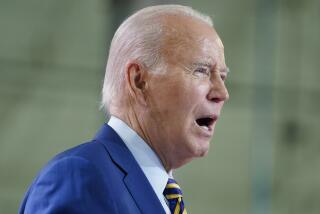President Obama promises ‘year of action’ in 2014
WASHINGTON — President Obama, despite a year marked by stumbles and unforced errors, vowed to deliver a “year of action” in 2014, telling reporters Friday that his healthcare law was rebounding, his immigration overhaul effort was still alive and his stormy relations with Congress were showing signs of “possible daylight breaking.”
The president’s sunny outlook for his sixth year, offered at his year-end news conference, came backed by some hopeful data for the beleaguered administration. More than 500,000 people have enrolled in healthcare plans using the federal website in December, bringing to more than 1 million the number who’ve selected insurance through the new federal and state marketplaces, Obama reported.
The numbers were the most comprehensive tally backing the White House assertion that enrollment has accelerated as some of the technical problems of HealthCare.gov have been resolved. Only 110,000 people had enrolled through the balky federal website in November.
Still, the figures are far behind initial enrollment targets, and Obama continues to be plagued by the problem-prone transition to the new healthcare system. His administration announced Thursday that it would allow some Americans to avoid the law’s core requirement to buy insurance, a decision Obama downplayed Friday.
“If there are adjustments that can be made to smooth out the transition, we should make them,” he said.
Obama addressed reporters hours before leaving for a two-week holiday break in Hawaii. His remarks came as many Democrats lamented that the White House had wasted the first year of his second term — the best window to advance his agenda — saying the administration had botched the healthcare rollout, only narrowly dodged a major confrontation with Congress over intervention in Syria, and mishandled revelations of domestic surveillance at the National Security Agency.
Asked whether this was the worst year of this presidency, Obama said he took a longer-term approach. “We have had ups, and we have had downs. I think this room has probably recorded at least 15 near-death experiences,” he said.
A laid-back and loose Obama replaced two other presidential personas far more familiar from news conferences past. Gone was the stern Obama issuing grave threats to lawmakers about government shutdowns and potential defaults, as well as the humbled Obama, chagrined by the healthcare glitches.
“I think 2014 needs to be a year of action,” the president said, later adding to his upbeat pronouncement a New Year’s resolution: “My New Year’s resolution is to be nicer to the White House press corps.”
Although reluctant to revisit his troubled year, Obama did acknowledge the rollout of the unworkable website as his greatest mistake.
He listed other disappointments, including the failure of his gun-control proposals introduced after the mass school shooting in Newtown, Conn., that killed 20 first-graders.
“Not passing background checks in the wake of Newtown is something that I continue to believe was a mistake,” Obama said, even then finding the bright side. “But then I also look at, because of the debate that occurred, all the work that’s been done at the state levels, to increase gun safety and to make sure that we don’t see tragedies like that happen again.”
The president’s remarks appeared aimed at not irking lawmakers after the recent spate of bipartisan collaboration in Congress. Obama showered praise on the cooperation that led to the two-year budget agreement passed Thursday in the Senate and now headed to his desk.
The deal fell short of two top Obama priorities: the grand bargain for deficit reduction and an extension for long-term unemployment insurance. But Obama pronounced it good enough.
“It’s probably too early to declare an outbreak of bipartisanship, but it’s also fair to say that we’re not condemned to endless gridlock. There are areas where we can work together,” he said.
Among those areas, Obama counted immigration, claiming only “a few difference here and there” with House Republican leaders who have, so far, refused to take up the Senate-passed overhaul.
Obama even downplayed the possibility of a standoff over the debt ceiling, repeating — with a smile — his warning that he would not negotiate over raising the nation’s legal limit on borrowing.
“I want to emphasize the positive as we enter into this holiday season,” he said.
When Obama did take a shot at lawmakers it was aimed, in part, at members of his own party. Twenty-six senators, including 13 Democrats, signed on Thursday to a bill that would further squeeze Iran’s economy if it failed to give ground in upcoming negotiations over its nuclear program.
“I think the politics of trying to look tough on Iran are often good when you’re running for office or if you’re in office,” he said.
The White House maintains that the new sanctions are unnecessary and could muck up the fragile deal. The interim agreement with Iran is one of the few successes of Obama’s second term.
With Democrats still worried about political blow-back from the healthcare rollout, the White House has taken steps to try to appease them. Those moves include the decision to exempt from the mandate roughly 500,000 people who received cancellation notices but have not yet bought new health plans.
That group of consumers will be allowed to claim a hardship exemption that would allow them to buy a bare-bones, catastrophic health policy or skip buying insurance altogether next year, Health and Human Services Secretary Kathleen Sebelius announced Thursday in a letter to senators who had inquired.
“What we’re talking about is a very specific population that received cancellation notices from insurance companies,” Obama said. “We just wanted to make sure that the hardship provision that was already existing in the law would also potentially apply to somebody who had problems during this transition period.”
In fact, the law includes a number of exemptions for people who cannot afford to buy health insurance or for other reasons are unable to obtain it. And even for those who do not qualify for an exemption, the penalty for not having insurance is relatively small, starting at $95.
Nonetheless, insurance companies have insisted the requirement is needed to ensure that coverage remains affordable now that they no longer are able to exclude people who have existing health problems. On Thursday, industry officials criticized the administration’s plan for hardship exemptions, saying that it could confuse consumers and destabilize insurance marketplaces.
Asked if the government would still enforce the law’s requirement that people buy insurance, Obama replied, “absolutely.”
kathleen.hennessey@latimes.com
More to Read
Start your day right
Sign up for Essential California for news, features and recommendations from the L.A. Times and beyond in your inbox six days a week.
You may occasionally receive promotional content from the Los Angeles Times.







